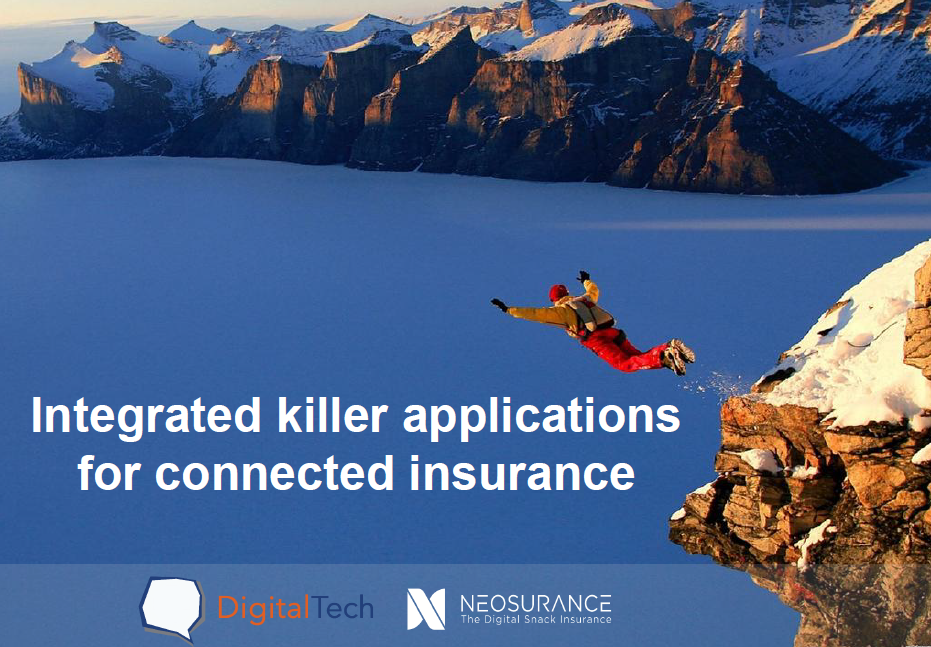
At the moment incumbents still rule the insurance world because of capital, infrastructure, knowledge of the sector and its customers and so on. Precisely because of that, established companies should be ready and very much capable of maximizing the value of solutions put forward by insurtech startups – which are plenty and resourceful but usually lack in deep knowledge about the insurance sector, legal barriers and are dependent on funding. Whether it’s risk reduction, cost optimization or context based pricing, the advantages should be by now more clear for incumbents so we expect to see more proactiveness from their part.
Change is already on its way though and the numbers prove it: according to CB Insights insurtech startups raised US$2.65 billion in 2015, an increase of 3.5x from a year ago. In the first nine months of 2016 the 10 largest insurance tech financing deals totaled just over $955M[1] so things are definitely moving and within this context Italy is also trying to make its mark.
The startup Digital Tech was present yesterday November 8th at the second day of the 18' Annual Assicurazioni in Milan sponsored by Sole24Ore in collaboration with Finanza & Mercati e Assicurazioni24. The event, divided in two days, allowed participants to understand the current insurance and financial landscape both national and international, as well as the future distribution strategies and alternative channels.
Among the topics discussed at the event: the most recent insurance regulations regarding the placement of insurance products with financial content and an interesting debate session focused on the implication of new technologies for the auto market – for example the self driving car - from an ethical, legislative and insurance risk reduction point of view. Moreover, there was an interesting analysis by BCG on the predicted evolution of the car fleet in the next 10 years and how consumers and policy makers show a positive attitude towards last generation cars in spite of all the privacy-related implications that come along.
Some of the biggest names in the insurance industry were present at the event, as for instance IVASS, Ania, Generali, Aviva, Unipol Group, AXA, Allianz and Zurich. One of the morning sessions was dedicated to insurtech startups that are disrupting the insurance sector with technological breakthroughs – a specific subset of the insurance industry that has raised over 16 billion over the last few years.

During the session, Andrea Silvello, co-founder of Digital Tech and Neosurance, shared the experience he has gained so far in the insurance industry.
“With Digital Tech, we developed a SaaS plug&play solution that allows the insurers to manage the entire value chain – from the data collection to the insurance sale,” says Silvello. The areas in which Digital Tech operates are mainly health and home connected insurance, while the operational geographies do not include only Italy, but Asia as well.
The second startup, Neosurance, caught on back at the beginning of 2016 as a spin-off of DigitalTech and Neosperience (the technological partner), and it already got three important acknowledgements. Neosurance proposes solutions for insurance companies based on the concept of micro-insurance: it takes only a few seconds to purchase short period insurance coverage directly from the smartphone in exchange for or a small amount of money. The core of the project is the AI behind the notification system, which is able to learn by doing and target each user with the right message at the right time. “In the micro-insurance policy, we see one of the main innovation streams for the global insurance industry. In developed countries it can be a means of reducing the protection gap on several different risks and to target millennials with low financial education and trust in physical intermediaries. Whereas in developing countries, push micro insurance may have significant social impact other than being a valuable tool for the insurer ” Silvello claims.
“We have a completely ‘partner-friendly’ system and we work as a technological service provider that positions itself between the Insurance Company (that offers the coverage) and the batch of final clients potentially interested in covering the same types of risks. Our business model does not imply direct acquisition of the final client, we completely rely on existing communities for that. We chose to do so for several reason: first of all the cost of acquisition for new clients would go straight up and it would be incompatible with our business model and with the segment t hat we are targeting with our micro insurance; secondly, if we were to be an insurer or an insurance intermediary we would face a highly regulated environment and would surely loose our main advantage that is versatility.”
The 2 founders have managed to come up with 5 million euro which allowed the startup to move quickly without searching for institutional funding: Digital Tech handles the insurance system while Neosperience provides the technological support. Silvello adds, “The ambitious growth of the project has determined us to schedule a first seed round in order to gather resources that would allow the project to become scalable in the next 12 to 18 months. The priorities are basically two: become independent from the founding companies and build a dedicated team by creating six new positions to handle business development and IT”.
Ultimately, the two startups want to assist the insurance sector in this great transformation which is by now irreversible. “Both our companies offer pragmatic solutions to the insurance companies that have to adapt to a variety of different scenarios and client needs in order to satisfy the final customer by creating products which are customized, safe, and within everyone’s reach.” concludes Silvello.

